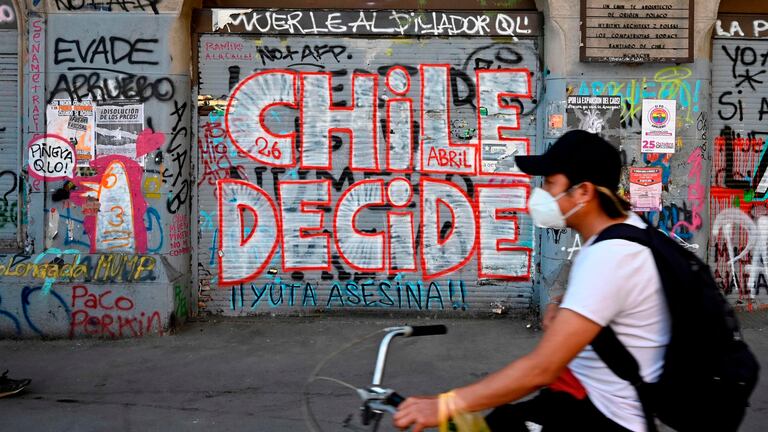A man on a bicycle passes this Friday, October 23, in front of a street graffiti that calls to vote in the constitutional plebiscite on Sunday.PEDRO UGARTE / AFP
Chile has 13,490 active cases of covid-19.
Those of voting age, suspected cases and their contacts will not be able to go to the polls on Sunday, when the historic plebiscite on the replacement of the current Constitution, drawn up during the Augusto Pinochet dictatorship, is held.
There are no alternative methods to face-to-face and the authorities have asked those infected not to defy the sanitary isolation regulations.
The Prosecutor's Office has warned that the sick who go to vote will be criminally prosecuted.
The president of the Medical College, Izkia Siches, one of the emerging and best valued figures in the midst of the pandemic, made an appeal on the radio this Friday: “We invite those infected with covid-19 to watch this process from television so as not to affect the participation of the rest ”.
"If we Chileans do an orderly process, following the recommendations of the Electoral Service, we should not have a greater increase in cases," he said.
The national prosecutor, Jorge Abbott, gave guidelines to the regional prosecutors in the event of possible infractions of the law in the framework of the plebiscite, especially in the face of those infected with covid-19 who want to assert their right to vote.
The highest authority of the Public Ministry warned that those infected and suspected cases who come to vote will be criminally prosecuted: "The right to life and health outweigh the right to vote," said Abbott, according to an email to which
The
Chilean newspaper
La Tercera
agreed
.
Since the pandemic started, some 80,000 people have been formalized or required for violating article 318 of the Penal Code, which determines the penalties for putting public health at risk.
Chilean law, however, guarantees that, if a person arrives at their polling place, they have the right to vote, even if they are breaking any rule.
Even someone who commits a crime within the precinct assigned to him by the electoral body can vote before being arrested.
If the Carabineros surprises a person with covid-19 inside the establishment, therefore, before returning him to the place where he is quarantined, he must allow him to exercise his political right.
The same would not happen if an infected person is caught on the way to their polling place or outside the center.
In that case, he would not be able to vote and the penalties would be applied.
On Sunday 14.7 million citizens over 18 years of age are summoned to the most important and symbolic electoral process that has been registered in Chile since 1988, with the plebiscite on the continuity of Augusto Pinochet.
They will decide whether to approve or reject the idea of changing the current Constitution of 1980, drawn up during the dictatorship.
For the first time in the world, citizens will be asked, at the same time, the body that will draft it: if a constitutional convention made up of 155 citizens specially elected for that purpose or a mixed convention of 172 members, integrated in equal parts ( 50% and 50%) by parliamentarians.
Therefore, voters will have to mark two ballots.
A new electoral protocol
The Electoral Service, together with the authorities of the Ministry of Health and technical organizations, prepared a protocol of almost 30 pages detailing the rules that will govern the referendum.
Among other issues, the distance from the tables where the members are located was reorganized and the curtains of the secret chamber were removed, which will be located in a position that guarantees the secrecy of the vote.
The regulations establish that each voter may arrive at the polling place with their own blue pen of any brand to cast their vote and the use of a mask will be required to enter, preferably disposable.
There will be an exclusive schedule for older adults –between two and five in the afternoon–, although they may do so at any time of the day with preference.
At the voting centers, there will be alcohol or chlorine-based disinfectants, 70% alcohol wet towels and paper towels or napkins to disinfect surfaces.
In addition, there will be gel alcohol for the voters.
Similarly, the authorities recommend bringing your own alcohol gel.
The government of Sebastián Piñera decided that voters from quarantined communes will not need special permission to vote on the day of the plebiscite.
This week, in addition, it launched a decalogue to combat the false news that circulates around the referendum, which will have an extended schedule due to the pandemic: between eight in the morning to eight at night.
Around a quarter past nine at night, 50% of the votes will already be counted and a quick total result is expected, which can be followed online on the Electoral Service website.
Since March, the covid-19 pandemic has infected 498,906 people in Chile and caused 13,844 deaths, accounting for only confirmed cases.

